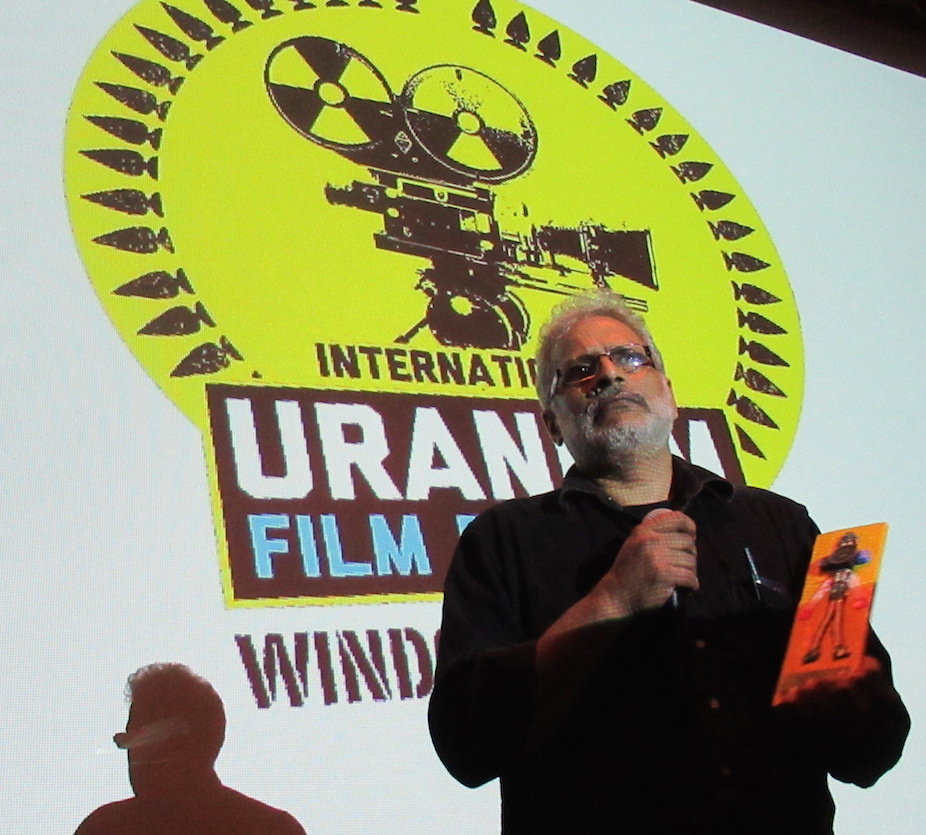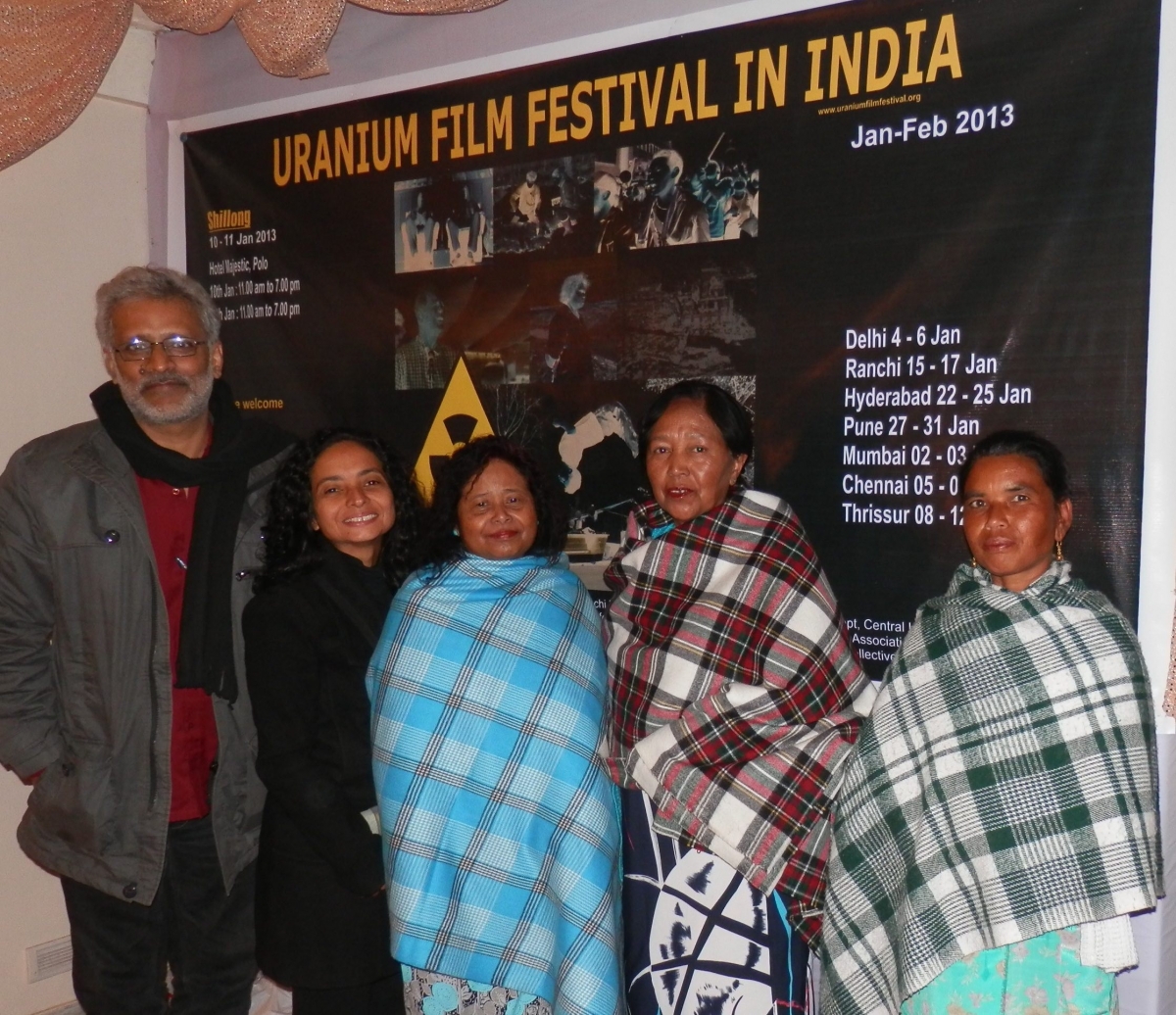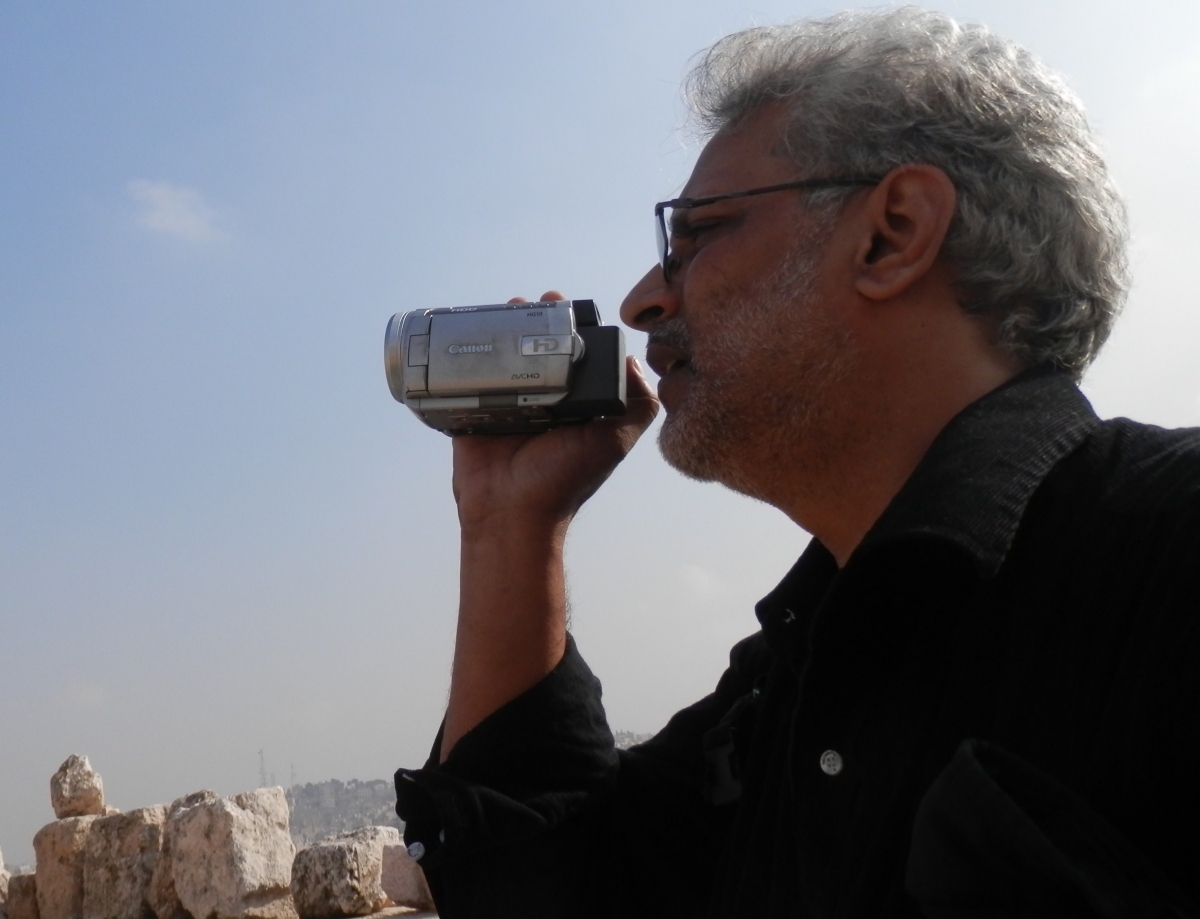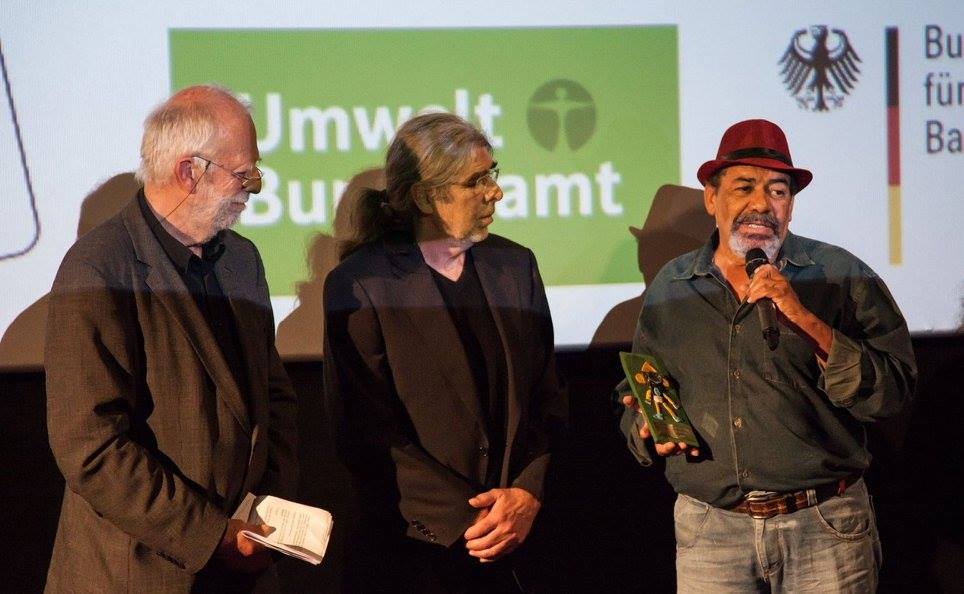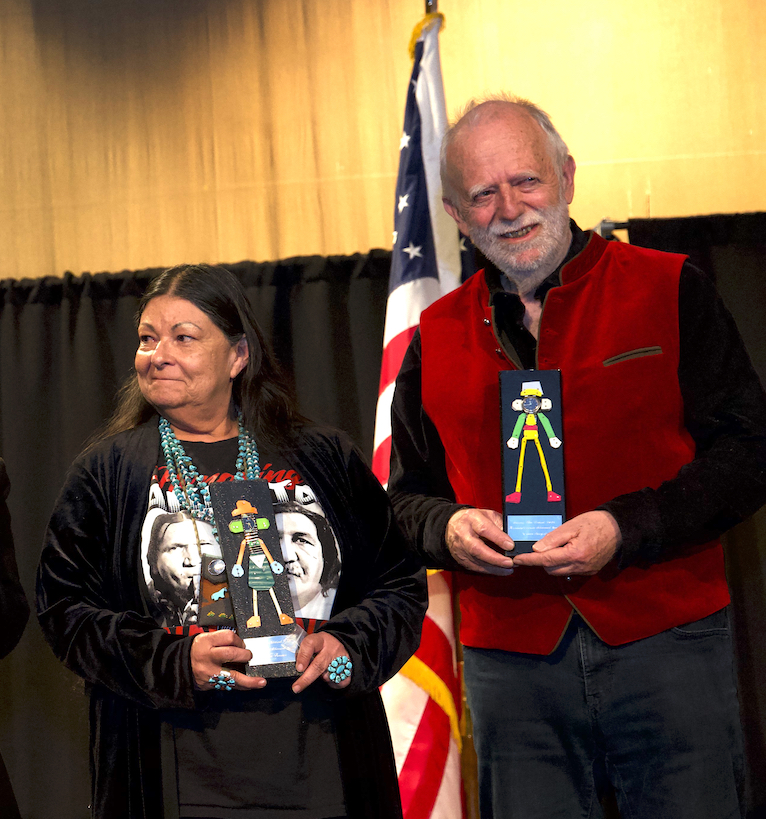IUFF Honorary Lifetime Achievement Award Winners
Since 2017 the International Uranium Film Festival (IUFF) honors special personalities of the „Atomic Age“ with its Honorary Lifetime Achievement Award.
The 2024 winners are Navajo activist Anna Rondon and German filmmaker & activist Claus Biegert.
Navajo activist Anna Marie Rondon is Executive Director New Mexico Social Justice and Equity Institute. Claus Biegert born in 1947 in Murnau, Bavaria, Germany, is journalist, filmmaker, founder of the Nuclear Free-Future Award and co-organizer of the legendary World Uranium Hearing in Salzburg, Austria, in 1992. Both, Anna and Claus, have been working tirelessly for decades to denounce the deadly risks of uranium mining and its legacy. They received the Award and Festival trophy at the Navajo Nation Museum in Window Rock, Arizona. Keep uranium in the ground.
2023 Winner in Rio de Janeiro: Libbe HaLevy
The International Uranium Film Festival Honorary Lifetime Achievement Award 2023 was given to a special personality and citizen of Los Angeles: Libbe HaLevy, producer and host of the weekly podcast/radio show Nuclear Hotseat (www.nuclearhotseat.com) who received in 2022 the Nuclear-Free Future Award. „Since 2011, Libbe HaLevy has done a tremendous and wonderful job enabling numerous nuclear activists, filmmakers and scientists to share their thoughts and opinions with hundreds of thousands of radio listeners around the world“, said festival co-director and founder Norbert G. Suchanek.
Festival executive director Márcia Gomes de Oliveira and award winner Libbe HaLevy in Rio de Janeiro, Modern Art Museum Cinematheque (MAM Rio) May 2023. (Photo: Felipe Corrêa Ascom Faetec)
2022 Winner Elsie Begay
Elsie Mae Begay, the great-great Navajo grandmother from Monument Valley featured in the documentary The Return of Navajo Boy by Jeff Spitz received the festival’s Honorary Lifetime Achievement Award 2022. Since the 1940s the Navajo Nation suffers because of uranium mining to fuel the nuclear arms arsenal of the United States of America. Like no other film before it, "The Return of Navajo Boy“ brought this fact to the public and mobilized people in the US and around the world. Grandmother Elsie was not only the main character of this unique documentary film. With her enduring commitment she greatly helped her Navajo Nation spread the truth about the horrific effects of uranium mining on her people.

With Navajo leaders she lobbied the US congress to clean up abandoned uranium mines and radioactive homes and provide safe drinking water for Navajo families in affected communities. Credited by the Associated Press with prompting the first clean up of an abandoned uranium mine, Grandmother Elsie, now 82 years old, continues to advocate for environmental justice. IUFF executive director Márcia Gomes de Oliveira says: „We honor Elsie Mae Begay for her leadership and creative contributions in the documentary film, The Return of Navajo Boy and for her courage in traveling thousands of miles to meet educators, students, journalists, and government officials all across the United States, especially in Washington DC. Through 15 webisodes showing what happened after the documentary, through her statements at public screenings and through her interviews with reporters who write about Elsie’s life experiences in Monument Valley her gentle voice continues to touch people’s hearts all around the world.“
„Together with film director Jeff Spitz and the Groundswell team you have succeeded in telling a powerful story that shows the importance of documentary filmmaking, Navajo culture, family history and above all the dangers of uranium contamination. For all these reasons, the 11th International Uranium Film Festival honors Great-Great-Grandmother Elsie with our Lifetime Achievement Award.“ New Video with Elsie!
Meet Elsie online! This exceptional online event of the International Uranium Film Festival brings together Elsie Begay, John Wayne Cly, filmmaker Jeff Spitz and representatives of indigenous peoples from the Brazilian northeast: Elvis Tabajara, Teka Potyguara, Jardel Potyguara and Toinho Gavião. English/Portuguese moderation by Brazilian filmmaker Miguel Silveira. This online event is a cooperation of International Uranium Film Festival with the Cinemateca do MAM Rio and Groundswell Educational Films in Chicago. Beside of the online meeting the festival streamed for free from May 19 - 29 dozens of films about nuclear power and uranium risks.
2021 Winners Sérgio de Queiroz Duarte & Robert E. Frye
The Rio de Janeiro International Uranium Film Festival 2021 has awarded two in the world of nuclear disarmament known elder statesmen with the festival’s Honorary Lifetime Achievement Award: Sérgio Duarte (photo), former UN Under-Secretary-General and High Representative for Disarmament Affairs who served Brazil as Ambassador in several countries and has dedicated his life to end the nuclear threat. And Emmy Award-Winning Producer and Director Robert Frye from New York City who created "The Nuclear World Project“ and directed two important documentaries on Nuclear Disarmament: „The Nuclear Requiem“ and „In My Lifetime“.
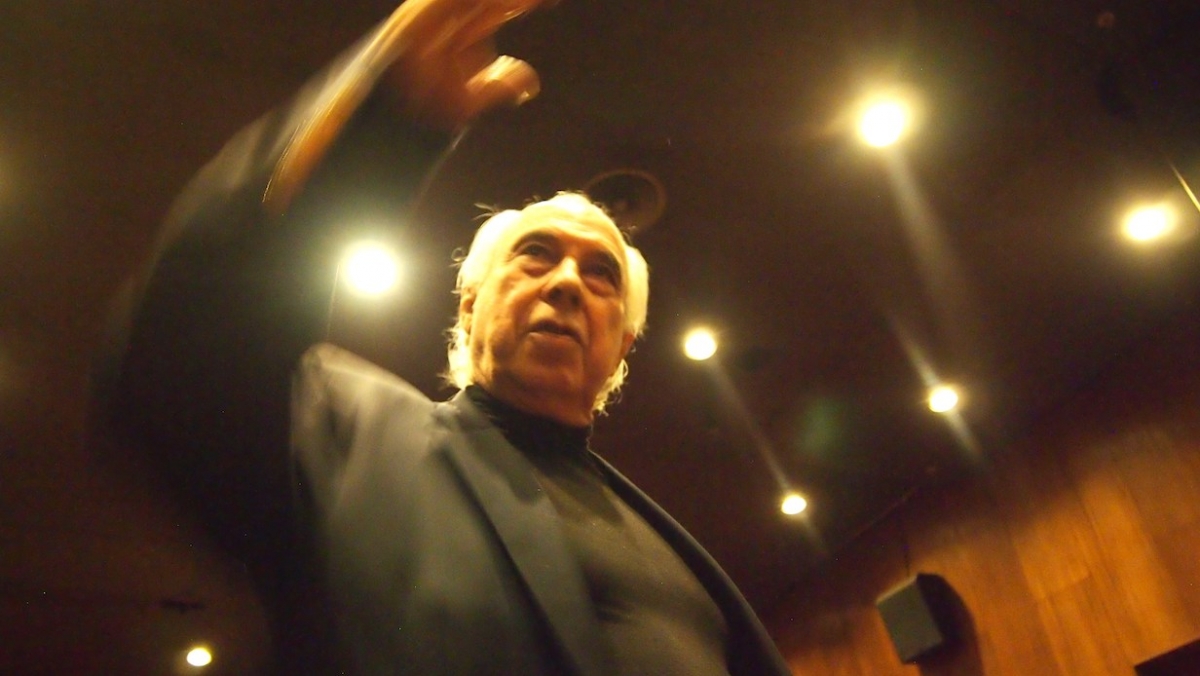
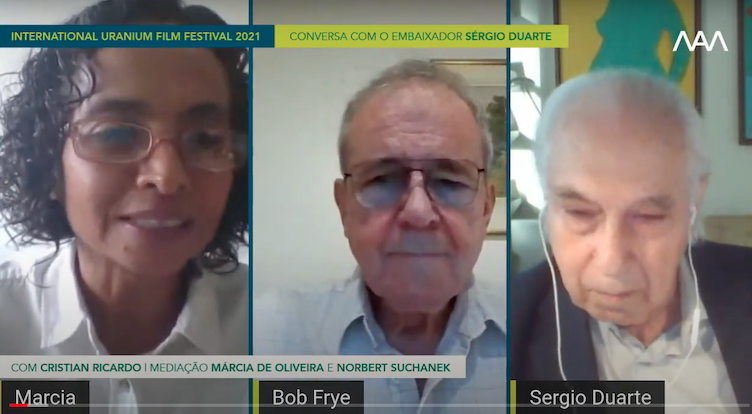
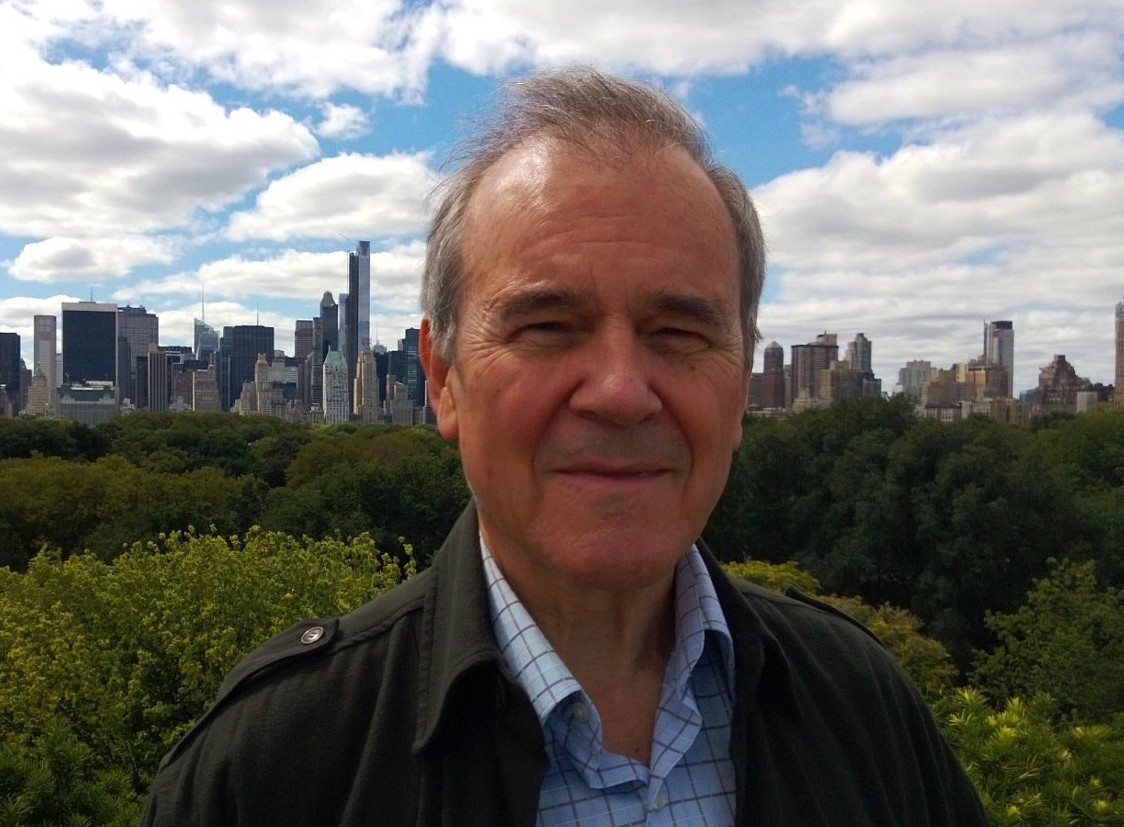
Sérgio de Queiroz Duarte is a former Brazilian diplomat who served as Ambassador to Nicaragua, Canada, China and Austria. Duarte was the President of the 2005 Review Conference of the Parties to the Treaty on the Non-Proliferation of Nuclear Weapons and was United Nations High Representative for Disarmament Affairs. He was his country’s Permanent Representative to the UN at Vienna and Chairman of the International Atomic Energy Agency Board of Governors. Duarte is President of „Pugwash Conferences on Science and World Affairs“, an organization founded in 1957 by philosopher Bertrand Russell and Sir Joseph Rotblat to contain the proliferation of atomic weapons. Pugwash won the Nobel Peace Prize in 1995. (Photo left)
Robert E. Frye is an Emmy award-winning producer of network news programs and independent documentaries for over five decades. He was born in Syracuse, NY USA, and studied political science and history at Hobart College. In 1958 he joined the U.S. Army. Frye worked on nuclear weapon planning while serving in Germany. The experience fostered a lifelong interest, which led him to create "The Nuclear World Project“. Starting in the '60s the Emmy and Peabody Award winner worked in New York City; Toronto; Washington, D.C.and London. His credits at ABC News include Executive Producer of "Good Morning America" and "ABC World News Tonight" with Peter Jennings; senior Producer at CBC's Weekend, and as an independent director & producer of several films for public television which include "In My Lifetime" and "The Nuclear Requiem". Frye said, the obligation of his generation is to tell the story of nuclear weapons, to make clear the indescribable damage they have caused and their potential to end life on the planet entirely.
http://www.thenuclearworld.org (Photo right)
Robert E. Frye says: "The recognition from the Uranium Film Festival comes as a completely unexpected surprise and may I say honor. The Festival trophy will be a reminder to me of the work ahead. Of course, may I say that the continuing work of Sergio Duarte is so important to the world, especially his words of wisdom and leadership over the years, now as the President of Pugwash International. The Uranium Film Festival is such a unique institution, with all the films chosen that honor the dedicated filmmakers, whose work appears in the Festival, calling the world's attention to the challenges dealing with the continuing presence of nuclear weapons, as well as, the conundrum of nuclear power. On the wall in my office I have the following quote from musician Leonard Cohen: Ring the bells that still can ring. Forget your perfect offering. There is a crack in everything. That's how the light gets in. Thank you for providing the opportunity for all these stories to be told. Keep the bells ringing!"
Nuclear Hotseat Radio Show Interview with Robert E. Frye / Watch also the festival's live with Sergio Duarte, Robert E. Frye, Cristian Wittmann & filmmaker Miguel Silveira (Portuguese/English)
2019 Winners in Rio de Janeiro: Takashi Morita & Kunihiko Bonkohara
Hibakusha from Brazil honored in Rio de Janeiro. The 9th International Uranium Film Festival awarded the Atomic Bomb Survivors Takashi Morita and Kunihiko Bonkohara. For decades 95 years old Takashi Morita and 78 years old Kunihiko Bonkohara are working tirelessly in Brazil for a world without nuclear weapons and since the Fukushima accident also for a world without nuclear power.
95 years old Takashi Morita (right) was 21, when the US dropped the Atomic bomb called „Little Boy“ over his city Hiroshima. Kunihiko Bonkohara (left) survived the Atomic Bomb over Nagasaki as a little child. Photo by Nobert Suchanek
95 years old Takashi Morita was 21, when the US dropped the Atomic bomb called „Little Boy“ over his city Hiroshima. Kunihiko Bonkohara survived the Atomic Bomb that was dropped a three days later over Nagasaki as a little child. Some of the A-Bomb survivors – known in Japanese as Hibakusha – were among a wave of 20th-century migrants who moved across the world in search of a better life after Japan surrendered to the US. Some came to live in Brazil including Takashi Morita and Kunihiko Bonkohara. Later in 1984 Morita founded in São Paulo the Associação das Vítimas da Bomba Atômica no Brasil representing the about 100 A-Bomb survivors living in Brazil.
See also the video: Hiroshima 74 anos: Performance em Homenagem às Vítimas das Bombas Atômicas - Hibakusha.
During the International Uranium Film Festival in Rio de Janeiro’s prestigious Modern Art Museum Cinematheque Takashi Morita & Kunihiko Bonkohara received the festival's Life Time Achievement Award, a trophy produced by Brazilian waste-material-artist Getúlio Damado. Getúlio creates the award from waste material, that he finds in the streets of Santa Teresa. He uses also old watches to remember the first atomic bomb dropped over Hiroshima. Watches in Hiroshima stopped exactly at 8:15 in the morning when the A-bomb exploded on August 6th, 1945.
2019 Winner in Portugal: JOSE HERRERA PLAZA
JOSE HERRERA PLAZA, director of the documentary
Broken Arrow. Nuclear Accident in Palomares (Operación Flecha Rota. Accidente Nuclear en Palomares) received in Portugal 2019 the Honorary Lifetime Achievement Award of the International Uranium Film Festival for his investigative efforts and long term dedication to unveil the dramatic nuclear accident at Palomares, the crash of an US-American aircraft carrying four nuclear bombs on board in 1966, and for his commitment to ensure that this accident that caused a permanent contamination of parts of Palomares with radioactive Plutonium will not be forgotten.
José Herrera with the award during the Uranium Film Festival 2019 in Nisa, Portugal. / Photo: Norbert Suchanek / More about José: Palomares Memory
2018 Winner in Berlin: António Minhoto
In the seventh year of the International Uranium Film Festival in Berlin, the festival remembered the former mining workers of the Urgeiriça uranium mine in central Portugal. October 2018, at the Zeiss-Grossplanetarium Cinema António Minhoto, born in 1952 in Portugal, received the festival's Honorary Lifetime Achievement Award in the name of all the former uranium miners, their families and and their descendants who suffer from the consequences and effects of radioactivity and radioactive contamination.
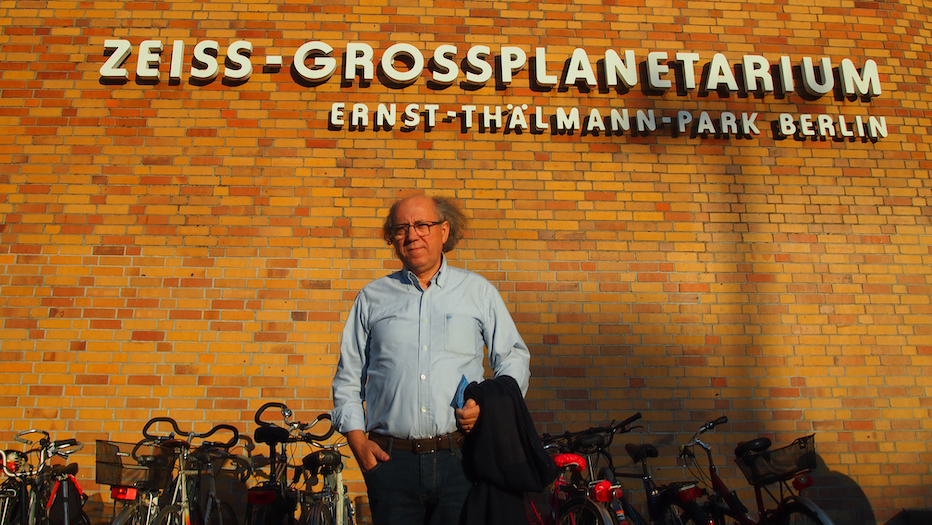
António Minhoto is one of those responsible for creating the Environmental Association AZU (Ambiente em Zonas Uraníferas) and the Association of former Workers of Uranium Mines in Portugal ATMU (Associação dos Ex-Trabalhadores das Minas de Urânio em Portugal) to fight for the rights of those who worked in the exploration of uranium and to struggle for a clean-up of the uranium mines and tailings.
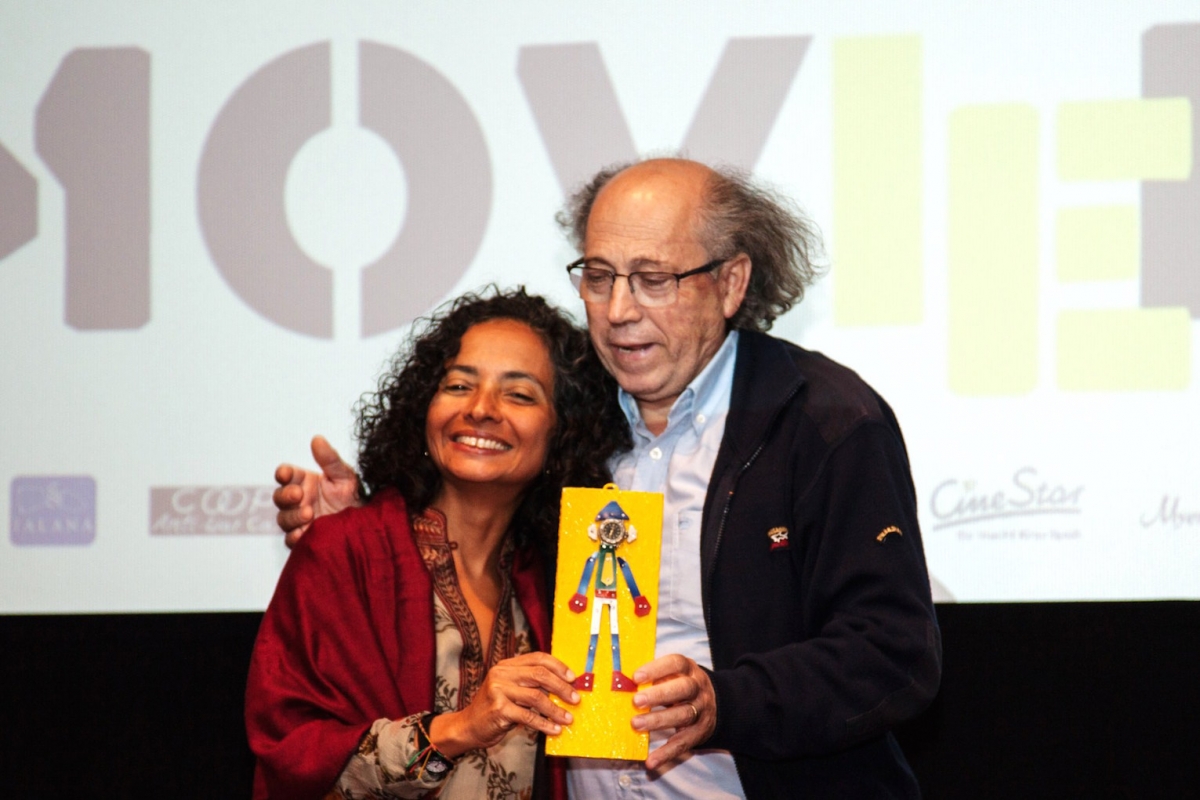 Minhoto worked in the administrative sector of the uranium mining company in Urgeiriça (municipality of Nelas, district of Viseu, province of Beira Alta), from 1976 to 1990, and was always concerned with the quality of workers' health. He recalls that the mine was not adequately ventilated and the uranium ore was transported in open trucks exposed to the wind. Old Wooden beams used as supports in the mine would have been used later to grill meat or sardines. For years Minhoto works tirelessly to give dignity to the victims of uranium mining and that this dark part of Portugal's history will not be forgotten. During the award ceremony in Berlin Minhoto dedicated the Uranium Film Festival Award to the 170 Urgeiriça workers who have already died and to all the other victims who are still suffering from the illnesses caused by uranium contamination. In addition António Minhoto invited the Uranium Film Festival to take place in Portugal in 2019 in Urgeiriça. (Photo: Festival director Márcia Gomes de Oliveira and António Minhoto in Berlin. / Photo Marek)
Minhoto worked in the administrative sector of the uranium mining company in Urgeiriça (municipality of Nelas, district of Viseu, province of Beira Alta), from 1976 to 1990, and was always concerned with the quality of workers' health. He recalls that the mine was not adequately ventilated and the uranium ore was transported in open trucks exposed to the wind. Old Wooden beams used as supports in the mine would have been used later to grill meat or sardines. For years Minhoto works tirelessly to give dignity to the victims of uranium mining and that this dark part of Portugal's history will not be forgotten. During the award ceremony in Berlin Minhoto dedicated the Uranium Film Festival Award to the 170 Urgeiriça workers who have already died and to all the other victims who are still suffering from the illnesses caused by uranium contamination. In addition António Minhoto invited the Uranium Film Festival to take place in Portugal in 2019 in Urgeiriça. (Photo: Festival director Márcia Gomes de Oliveira and António Minhoto in Berlin. / Photo Marek)
Interview/video with António Minhoto at the Uranium Film Festival Berlin 2018, at the Zeiss-Grossplanetarium, 14 Oct. 2018.
2018 Winner in Window Rock: Shri Prakash
The International Uranium Film Festival was 2018 again held in Window Rock at the Navajo Nation Museum. Filmmaker Shri Prakash from Ranchi in India received there the International Uranium Film Festival Lifetime Achievement Award „for fighting the uranium industry for more than 20 years with his camera and for giving the voiceless uranium victims, the indigenous Adivasi people from Jadugoda a powerfull voice“. Shri is national awarded director of the first documentary film on uranium mining and its deadly impacts on the indigenous people „Adivasi“ in Jharkhand: „Buddha Weeps in Jadugoda“. In addition Shri co-organized twice the International Uranium Film Festival in 10 cities in India, in 2013 and 2014.
„With our award we also intend to stimulate new productions about uranium mining and the consequences of the nuclear industry and to help Shri Prakash to continue with his important work and to inspire others to follow his steps“, said festival director Norbert G. Suchanek. Website of Shri Prakash:
https://shriprakash.com
2017 Winner in Berlin: Odesson Alves Ferreira
Odesson Alves Ferreira is surviver of the „radioactive“ accident of Goiânia in Brazil, 1987. For more than 30 years Odesson has been tirelessly educating about this accident caused by cesium-137 so that it is neither forgotten nor repeated. In addition, he was long time president of the Association of Cesium-137 Victims (AVCésio) and fought for state recognition and adequate medical care for the surviving victims.
Odesson (right) receiving the Award 2017 in Berlin. Nuclear Free-Future Award founder Claus Biegert (left) made the intruduction. / Photo: Marek.
The story of Odesson Alves Ferreira as advocate for the Cesium-137 victims begins September 13th, 1987, when he was 32 years old and worked as bus driver in Goiânia. His wife had recently gave birth to his daughter. Two youngsters in search for scrap metal found an abandoned cesium-137 tele-therapy unit in the demolished and unsecured remnant of a cancer treatment institute in the centre of Goiânia. Unknowing the deadly risk they pulled out the heavy lead cylinder that contained the radioactive source, about 19 grams of cesium-137, once probably imported from the Oak Ridge National Laboratory. They dragged the heavy capsule home in a wheelbarrow and exposed themselves to high levels of radiation. A few days later they sold the device to the scrap metal dealer in their neighborhood, Devair Ferreira, the brother of Odesson. Likewise, without any idea of the risk of radiation Devair opened that radioactive Pandora box. He discovers the white crystal powder that glows bluish in the dark: cesium-137 chloride - the death glow! Hundreds of people in Goiânia became radioactive victims. Odesson was one of the first who were heavily contaminated.
Video Odesson in Berlin:
https://www.youtube.com/watch?v=znNTa_QRYAk

Festival team
Norbert G. Suchanek
International Uranium Film Festival
General Director and Co-Founder
Email: norbert.suchanek@ uraniumfilmfestival.org
Márcia Gomes de Oliveira
International Uranium Film Festival
Rio de Janeiro
Executive Director and Co-Founder
Email: uraniofestival@ gmail.com
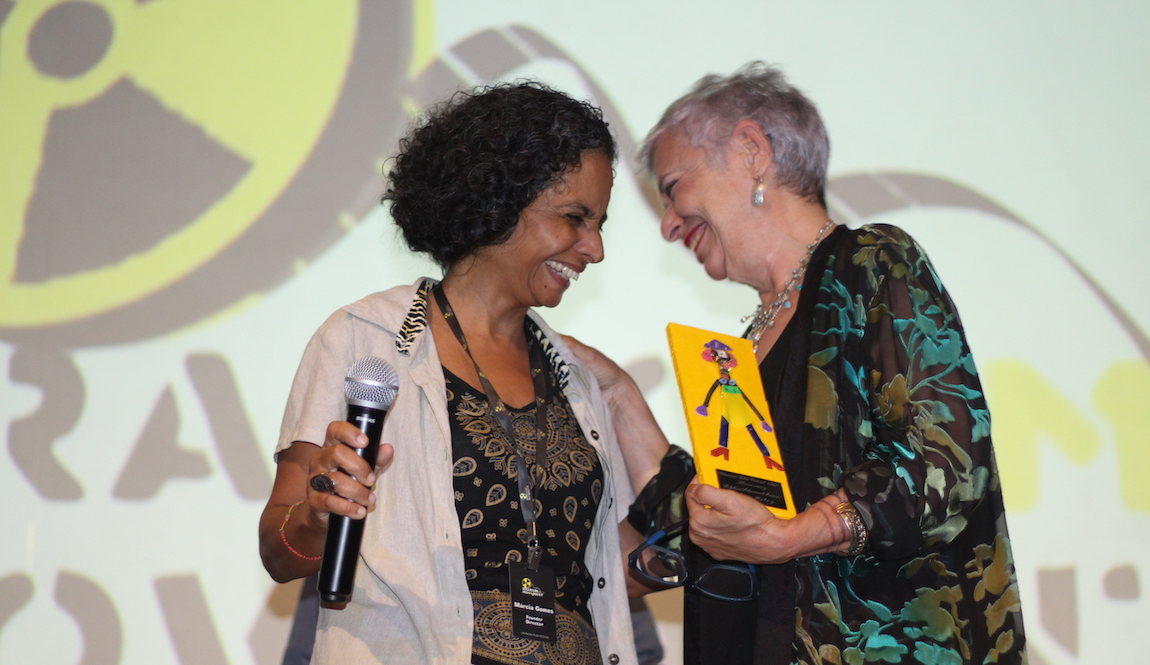

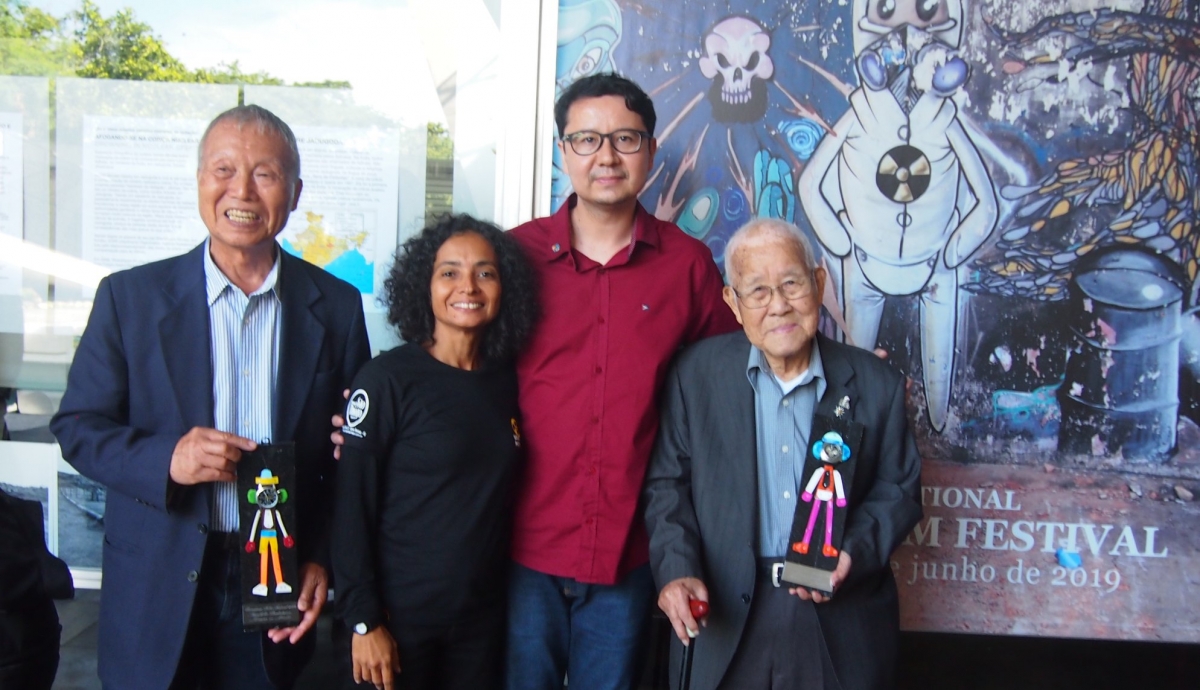
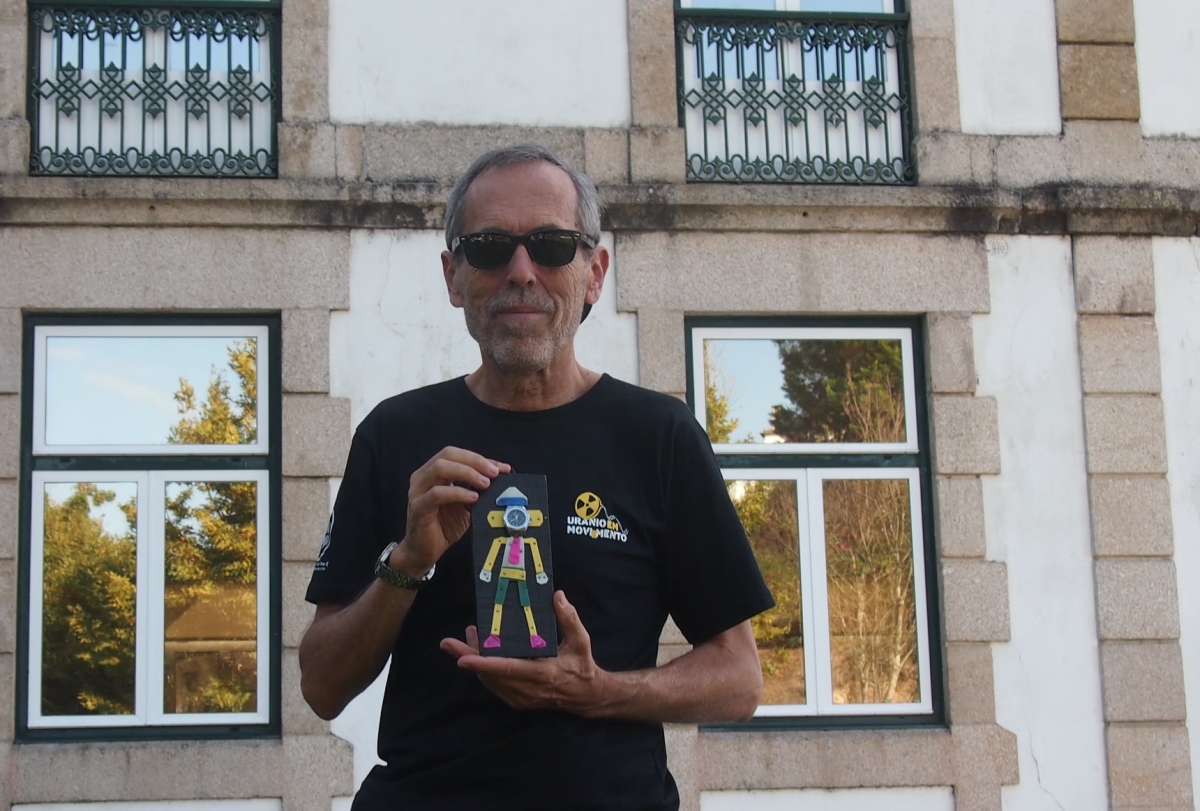

 Minhoto worked in the administrative sector of the uranium mining company in Urgeiriça (municipality of Nelas, district of Viseu, province of Beira Alta), from 1976 to 1990, and was always concerned with the quality of workers' health. He recalls that the mine was not adequately ventilated and the uranium ore was transported in open trucks exposed to the wind. Old Wooden beams used as supports in the mine would have been used later to grill meat or sardines. For years Minhoto works tirelessly to give dignity to the victims of uranium mining and that this dark part of Portugal's history will not be forgotten. During the award ceremony in Berlin Minhoto dedicated the Uranium Film Festival Award to the 170 Urgeiriça workers who have already died and to all the other victims who are still suffering from the illnesses caused by uranium contamination. In addition António Minhoto invited the Uranium Film Festival to take place in Portugal in 2019 in Urgeiriça. (Photo: Festival director Márcia Gomes de Oliveira and António Minhoto in Berlin. / Photo Marek)
Minhoto worked in the administrative sector of the uranium mining company in Urgeiriça (municipality of Nelas, district of Viseu, province of Beira Alta), from 1976 to 1990, and was always concerned with the quality of workers' health. He recalls that the mine was not adequately ventilated and the uranium ore was transported in open trucks exposed to the wind. Old Wooden beams used as supports in the mine would have been used later to grill meat or sardines. For years Minhoto works tirelessly to give dignity to the victims of uranium mining and that this dark part of Portugal's history will not be forgotten. During the award ceremony in Berlin Minhoto dedicated the Uranium Film Festival Award to the 170 Urgeiriça workers who have already died and to all the other victims who are still suffering from the illnesses caused by uranium contamination. In addition António Minhoto invited the Uranium Film Festival to take place in Portugal in 2019 in Urgeiriça. (Photo: Festival director Márcia Gomes de Oliveira and António Minhoto in Berlin. / Photo Marek) 